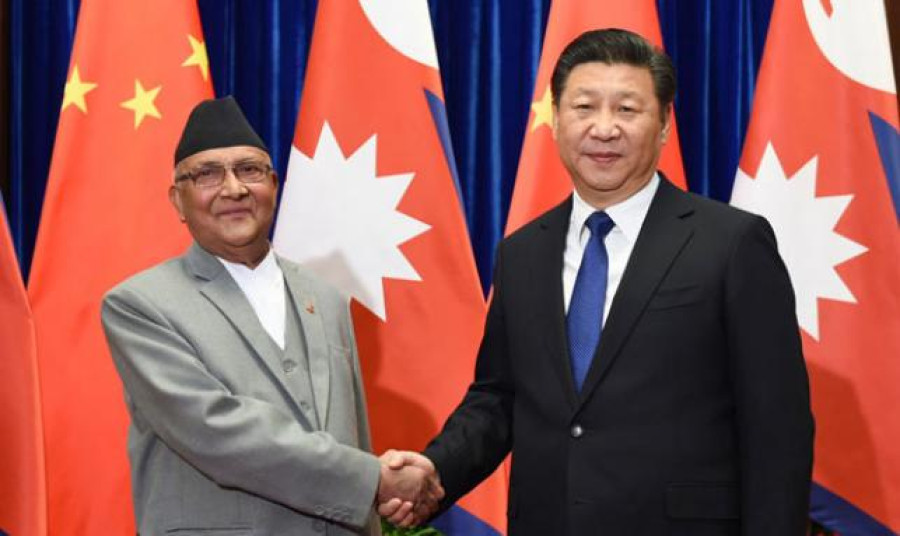Columns
Eyes north, ears south
Oli sets sights on Beijing after hearing silence from Delhi—fine, unless it’s reactionary.
Sanjeev Satgainya
It’s now all but certain: Oli will visit China in early December. This trip would mark a break from the tradition of Nepali prime ministers making their first “official” visit to India. There is nothing to quibble about, as flying to New Delhi first is merely an unwritten custom, not a formal requirement. So, Oli’s planned visit to Beijing isn’t a breach of any protocol; rather, it could set a precedent.
Yet questions have lingered over why Indian Prime Minister Narendra Modi hasn’t extended an invitation to Oli, sparking speculation that Oli began planning a trip to China after waiting in vain for an invite from New Delhi. In some circles, there is a belief that Oli’s ascension to power is not to India’s liking. Some within Oli’s orbit have remarked that certain foreign powers have been trying to unseat the government without providing evidence to support this claim.
Oli and India amid global shifts
Even Oli can’t deny that his past actions and rhetoric have frequently irked New Delhi. While his assertive stance may have earned him a “nationalist” image among sections of Nepali society, it has also placed him in India’s bad books. Attempts at rapprochement have been met with a cold shoulder, leaving him to orchestrate his return to power. Since the 2022 elections, he’s worn many hats: Coalition partner, opposition leader, and now, once again, prime minister.
Yet India appears unconvinced. While Modi’s government rolled out the red carpet for Arzu Rana Deuba of the Nepali Congress, who serves as foreign minister in Oli’s Cabinet, it has yet to extend an invitation to Oli, despite him being in office for over 100 days and even meeting Modi in New York in September. Meanwhile, Oli’s government has repeatedly signalled its keenness to host Modi in Nepal, failing to elicit any concrete response.
Then, has India abandoned its long-standing tradition of hosting the Nepali prime minister soon after a new government is formed? If so, this raises broader questions about India’s much-touted “Neighborhood First” policy. Extending an invitation to Oli could have shown goodwill and reinforced New Delhi’s proclamation that “Nepal is a special priority partner.”
Amid rapid geopolitical shifts, India may have set its sights on bigger platforms and larger roles in the world order, but it would do well not to ignore its neighbours or treat them based on the government of the day.
On Nepal’s part, its foreign policy is becoming increasingly complex, extending beyond bilateral ties with India and China, as Sino-Indian and Sino-American tensions and interests intersect more with a growing US influence in Asia amid shifting global dynamics. Oli, as the incumbent, needs to tread carefully. His role demands deft management of relations with India and China while also recalibrating Nepal’s strategic posture in a complex and evolving geopolitical landscape.
The northern nexus
Nepal’s communist leaders often lean towards, or appear to align with, China when they want to “send a message” to India. Oli is no exception. Even before an official invitation was extended, extensive media reports outlined Oli’s potential agenda for the trip, including efforts to secure a loan waiver for the Pokhara International Airport and agreements on some Belt and Road Initiative (BRI) projects. The Chinese, who often practise quiet diplomacy, have yet to comment on Oli's planned visit. Meanwhile, the BRI remains a contentious issue in Nepal, with Beijing eager to reframe all China-funded projects under its banner.
Oli currently leads a strong government with support from the Nepali Congress, the largest party in Parliament. Congress’s position on the BRI and other forms of assistance is clear—grants are acceptable but loans are not. If Oli avoids pushing too aggressively with China, potentially unsettling his coalition partner, his position remains secure. Deeper engagement with China could bring valuable infrastructure projects, but it also raises concerns about long-term dependency and potential political leverage. It’s up to Nepali leaders—especially Oli—to negotiate beneficial terms.
The Nepali public is divided on Chinese aid: Some see it as a counterbalance to dependence on India, while others fear it might lead to undue influence from the north. Both views have merit and flaws, making it crucial for the current leadership to steer Nepal’s foreign policy in a direction that serves and safeguards the country’s interests.
While Nepal could benefit from its northern neighbour’s economic and technological might, it is not in a position to ignore its southern neighbour, with whom it not only shares historical, cultural and people-to-people ties but also carries out a majority of its trade.
The catch
Diplomacy often works best when conducted quietly. Oli’s “preparations” to visit Beijing could have been kept under wraps until concrete plans were in place. The premature leak of his intentions by his circle allows room for speculation that this may have been a tactic to pressure India.
While China seeks to expand its influence in Nepal, it remains cautious about provoking India to the point of confrontation. And India, too, appears hesitant to employ its usual political manoeuvres in Nepal, particularly after recent setbacks in its immediate neighbourhood. As the Sino-Indian relations show signs of thawing, Nepal stands to benefit from reduced regional tension. Oli would be wise to avoid antagonising either neighbour.
Nonetheless, Oli has an uncanny inclination to critique India. While he uses backchannels to re-engage with New Delhi, his public jabs at India reveal his characteristic defiance. If his plan to visit China is driven more by spite than by a balanced foreign policy strategy, he risks making a strategic misstep.
Even after over 100 days in office, Oli’s performance has been dismal on various domestic fronts. Neither Oli nor his coalition partner, the Nepali Congress, has been able to justify the formation of this “stable” government.
With his political legacy on the line, Oli has an opportunity to “achieve something meaningful” as prime minister, and he should approach foreign policy with a view toward lasting impact.
Foreign policy is certainly a tough balancing act for a country like Nepal, sandwiched between the world’s two large economies. In an era of fluid geopolitics, future Nepali leaders will likely face further challenges in balancing relations with both neighbours. Nepali politicians’ failure to pursue a cohesive and balanced foreign policy has already tarnished Nepal’s international image.
In the intricate world of foreign policy, there’s little room for grandstanding. And, adventurism can backfire. Oli has a unique chance to set a precedent for independent, balanced diplomacy that could serve as a model for the country and his successors.
His China sojourn could go beyond simply breaking the so-called custom of prioritising one neighbour over the other; it might even pave the way for a new approach. But this must be done in the best interest of Nepal, not to satisfy personal pride or vanity.




 18.12°C Kathmandu
18.12°C Kathmandu















